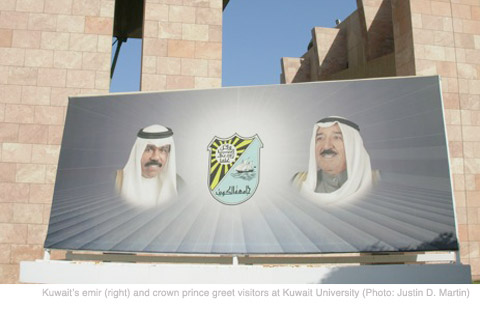KUWAIT CITY—Emir Sabah al-Ahmed al-Jaber al-Sabah’s small Arab nation isn’t generally known as the most open society. Homosexuality is illegal. Pork and booze are, too. Kuwaiti women have been allowed to vote for only the last five years. The heir to the country’s throne must be a male born in wedlock of Muslim parents.
One may be surprised, then, that Kuwait has one of the freest press systems in the Arab world. Freedom House rates this country of upwards of three million the freest press of any country in the Middle East and North Africa (with the exception of Lebanon, with which Kuwait is tied). The New York Times has written that “[i]n some ways, Kuwait is the most democratic country in the Arab world, aside from Lebanon.”

Unlike in the UAE, Egypt, Jordan, and elsewhere in the region, all daily English and Arabic newspapers in Kuwait are privately owned, as are several television networks. Freedom House counts Kuwaiti newspapers “among the most outspoken and aggressive in the region.” As in the U.S., libel in Kuwait is a civil offense that can incur financial damages, not a crime drawing jail time.
The U.S. State Department’s 2008 report on human rights in Kuwait noted that “pointed criticism of ministers and high-ranking government officials was widespread.”
Press freedoms in Kuwait, though, stop short of the palace walls. Despite Kuwait’s diverse and vocal press, criticism of the emir, Arabic for “prince,” leads to incarceration. Article 54 of Kuwait’s constitution states, “The Emir is the head of the State. His person shall be immune and inviolable.” Deviously vague, yet strictly enforced.
Were I to toss at the emir, on Kuwaiti soil, the kind of criticism I’ve directed at Hosni Mubarak in Egypt, I’m confident I would be swiftly arrested and deported. The State Department report mentioned the story of an Australian woman arrested at Kuwait airport and sentenced to two years in prison for insulting the emir during an altercation with airport security, although she was later released.
In June 2010, Human Rights Watch reported that Kuwaiti journalist and blogger Mohammad al-Jasim was jailed without trial for seven weeks for a “slight to the personage of the Emir,” despite that police forces never obtained the judicial order to hold him that long. The same reporter was locked up in May 2009 for challenging other members of the ruling family.
Kuwaitis can do a lot at their keyboards, but criticizing God or the emir makes a prisoner.
While I don’t doubt that inheriting a country and immunity from domestic brickbats are pleasant birthrights for Kuwait’s emir, it would actually be in his interests to decriminalize criticism in his direction. Kuwait has a lot going for it, including a democratically elected parliament and sky-high standards of living. The country is rich and will be so for some time, but the energy it sells is not endless, nor are the services it provides. This is true of all oil-rich Gulf states, but Kuwait has been particularly shortsighted in diversifying its income streams. Unlike Bahrain and the UAE, Kuwait has no meaningful tourism industry, and the country attracts the lowest amount of foreign direct investment of any state in the Gulf Cooperation Council. As their resources run out, Kuwaitis will inevitably become less tolerant of dynastic rule.
The emir is not a legitimate head of state, in simple democratic terms, and has little moral authority to comprehensively tax his people and persuade them to accept hereditary rule. For these reasons, Kuwait has what’s called a rentier economy, meaning that much of the country’s GDP comes from foreign “rents,” which are doled out to citizens to keep them content and relatively quiet. The Kuwaiti constitution expressly guarantees social security, medical care, and free education, but makes no mention of any tax policies which will sustain these services in years to come. When Kuwait inevitably raises taxes and drops services, there’s bound to be unrest.
Kuwait’s leadership would be wise to decriminalize criticism of the emir and his relatives, in order to decrease the perceived distance between the palaces and the public, and take an important step in transforming his country into a modern, and democratic, constitutional monarchy. By tolerating non-sham parliamentary elections and a privately owned press, Kuwait’s rulers have made important steps already, but the press must also be allowed to criticize the royals behind the curtain.
Thinking narrowly, one could argue that, if Kuwaitis are restive, it actually makes sense for the emir to stifle dissent. After all, it’s helped other Arab autocrats prolong their rule. But this is a short-sighted strategy that would ultimately prove economically foolish. “Any country that wants to participate fully in the economic life of the planet,” wrote former Chicago Tribune editor Jack Fuller in his 2010 book What’s Happening to News?, “must eventually open itself to what to some regimes must feel is dangerously free expression.”
Al-Sabah may consider opening the doors of dissent to him and his policies a risky proposition, but more dangerous for this elite, I promise, is to sit unquestioned on his royal perch while his country has to cut back its rentier rewards. Embracing more features of legitimate constitutional monarchies would help Kuwait’s fortunate son preserve some of his country’s royal traditions, while giving the people who will have to shoulder the country’s future expenses more freedom to speak about their way forward.
Justin D. Martin is a journalism professor at Northwestern University in Qatar. Follow him on Twitter: @Justin_D_Martin
